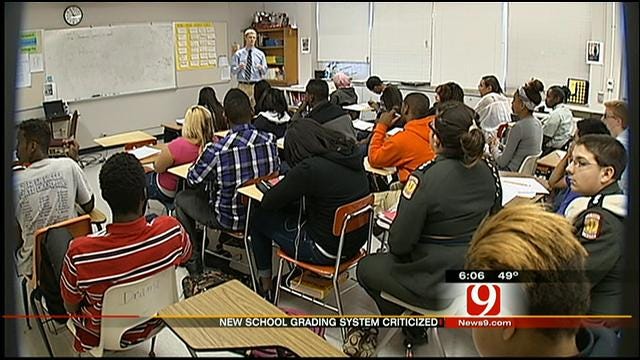Panel Calls Oklahoma School Grading System 'Meaningless'
The A-F school grading system was significantly flawed and "meaningless for school improvement," according to a panel of researchers from the University of Oklahoma and Oklahoma State University.Thursday, January 17th 2013, 1:52 pm
The A-F school grading system was significantly flawed and "meaningless for school improvement," according to a panel of researchers from the University of Oklahoma and Oklahoma State University.
The group announced its findings after an intense look at the current model implemented by the Oklahoma State Board of Education last year.
The analysis of the A-F Report Card System came after several Board of Education members voiced concerns over the current model used to rank school performances. According to the researchers, there were several shortcomings in the way the Oklahoma's schools were graded.
The researchers, made up of members from The Oklahoma Center for Education Policy at the University of Oklahoma and The Center for Educational Research and Evaluation at Oklahoma State University, conducted the study at the request of two education advocacy groups.
10/5/2012 Related Story: OK State Superintendent Responds To Criticism On A-F Grading System
The Cooperative Council of Oklahoma School Administration and Oklahoma State School Boards Association raised concerns over the current formula used to calculate a school's grade.
Steven Crawford from CCOSA said they wanted a third-party analysis on the A-F Report Cards that would not be "bias" in any way.
"We believe that the ‘A' or the ‘F' have very little meaning in the current system; that you really can't tell from either grade what's going on at the school house and so that was our whole intention of asking that doesn't have a bias; that doesn't get a grade; that would take a look at this from a statistical perspective as well as a useful perspective," explained Crawford. "If I have a student that had five ‘A' and two ‘D', we'd probably give that student a ‘B' in the current system, but we're really out to focus on the two ‘D's' and figure out what's going on there so that's a fallacy in going to a single letter grade. I think multiple measures make a lot of sense."
Ultimately, the panel announced that the grading system needed to be totally reworked and offered six ways to change the system to better measure school performance across the state. These include looking at more performance measurements, more often, throughout the year. That, ultimately, will provide a more meaningful measurement for parents, schools and the state to look at.
An additional major component of a new grading system, according to the researchers, is providing schools with an understanding of what areas they performed poorly and why, followed by steps to take to improve on those areas.
10/25/2012 Related Story: State Department Of Education Releases Grades For Oklahoma Schools
Dr. Patrick Forsyth from the University of Oklahoma said the current system was "meaningless for school improvement purposes." He and his colleagues agreed that a simple grading system, while easy to understand, did not actually provide meaningful information to the schools or parents.
For instance, a "B" to many parents shows their school is performing above-average based on criteria, but it does not provide any information on what areas the school is performing high and what area the school is performing low, which the researchers said would actually be more vital information.
Likewise, an "F" would upset parents, but the current system does not break down the "why" factor enough for parents. Therefore, the researchers suggested grading on several factors individually rather than trying to figure out what single grade the school deserves overall. That suggestion would develop a report card that breaks down a school's performance in several categories, creating a more transparent system for parents to understand where their children's schools perform well or poorly.
In addition, Dr. Mwarumba Mwavita with Oklahoma State University, spoke to the difficulty of capturing a student's learning on a measured scale when it is a one-size fits all.
Dr. Laura L.B. Barnes from Oklahoma State University stated now is also a good time to take a comprehensive look at Oklahoma's education system on a larger level, while the public is engaged in the topic. She said bringing all the players to the table could actually present some good long-term solutions to improving Oklahoma's school performances. Her colleagues echoed that point-of-view during the meeting.
More Like This
January 17th, 2013
September 29th, 2024
September 17th, 2024
Top Headlines
December 26th, 2024
December 26th, 2024
December 26th, 2024










